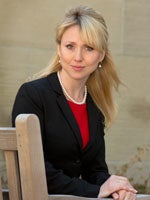Like others in Harvard Law School’s LL.M. class of 2013, Maryna Kavaleuskaya practiced law abroad before coming to America for additional legal training. And, like many of her 187 classmates—most of them from overseas—she had to overcome obstacles along the way.
But unlike most others, Kavaleuskaya will be unable to return to a normal life back home after she receives her Harvard degree.
Kavaleuskaya, a Belarusian lawyer who dared to represent the jailed presidential challenger Andrei Sannikov and other political prisoners before she made it to Harvard, has endured retaliatory attempts by the Belarus regime to intimidate her, restrict her travel, and threaten her safety.
That’s why, in a talk at HLS on April 3, she expressed an earnest hope that her classmates will continue the work she started, after they return to their own countries. “I trust in your great potential,” she told them. “I know that one day some of you will be making decisions which could influence the situation in Belarus. Every person has a right to live in a country where the rule of law is not in question. This is our mission, this is why we chose the profession or maybe were chosen by it.”
In December 2010, just a month after Kavaleuskaya completed her legal training, Belarus—which has been governed by Alexander Lukashenko since 1994—held a presidential election. “It was evident that Lukashenko would remain in power, as falsification had become an integral part of the Belarusian election process,” Kavaleuskaya said.
On election night the streets of Minsk were filled with a massive, mostly peaceful protest. After a minor provocation, the Belarusian KGB arrested and imprisoned some 700 people, including all of the opposition candidates, Kavaleuskaya’s future client among them.
“The EU and U.S. officials reacted immediately, demanding the release of political prisoners,” Kavaleuskaya noted. “However, the situation in the country became even more tense. Most of the presidential candidates were completely isolated. Their attorneys were prohibited from visiting their clients and providing them with legal help. The families didn’t get any letters. In some cases, there were serious concerns about whether the prisoners were actually alive.”
Two and a half months after his arrest, Kavaleuskaya received a call from Sannikov’s 85-year-old mother. “She was looking for an attorney who would agree to represent her son, and [she] was devastated,” she recalled. “His previous attorney was disbarred and no one else was eager to work on the case.” Sannikov’s wife, a journalist, was also imprisoned for political reasons, and social workers threatened to take their young son away from his grandparents.
In Belarus, she explained, many attorneys work under the supervision of the country’s bar associations, which operate, and sometimes chafe, under the broad control of the Ministry of Justice. “As the official procedural tools such as complaints and motions didn’t lead to any results, attorneys started to use the only available source—mass media—to raise concerns about rights violations. The KGB reacted immediately by forcing the bar associations to disbar [attorneys] who were fighting for their clients’ fundamental rights,” she added.
“I realized the tremendous responsibility and the risks when accepting the offer,” Kavaleuskaya admitted. “It was a decision that was not easy to make, but I believed deeply in the principles of [legal] work and I was supported by my husband and son.”
“From the very beginning we decided that we were going to work in the way we would work under the conditions of the rule of law,” she continued; “we tried to document every single violation and file every possible complaint.” Like her predecessors, Kavaleuskaya was threatened with disbarment and “sometimes with more serious consequences;” the bar association was demanding that she “stop using even the most typical procedural means and withdraw from the cases I was working on.”
There were never any lawful grounds for Sannikov’s detention, she noted, “and by the end of the investigation it became obvious that [the] KGB failed to even falsify the criminal case properly, as the evidence was to some extent absurd. … Even the prosecutor could not help smiling when he saw ‘House,’ [the American medical drama], presented as video evidence by the KGB in the courtroom,” Kavaleuskaya added, telling her serious story with flashes of humor.
“I could at least influence the situation by bringing to light the numerous violations and perverted functioning of the law-enforcement and judicial systems,” Kavaleuskaya noted. “I could spread this knowledge and help my client feel confident about our legal position and protected in this regard.”
Before the trial, government officials and the government-controlled mass media declared that Sannikov was guilty, and in the end, the trial judge agreed: Sannikov was sentenced to five years in prison. (He was released in 2012 and granted asylum in the United Kingdom.)
Kavaleuskaya, in turn, was detained at the border when her family tried to take a weekend trip. “The official reason for this caused not only anger but also a sincere laugh,” she admits; “the authorities banned my constitutional right to freedom of movement under the reason of military draft evasion, which, considering the fact that in Belarus women are not subject to military draft, is a little overreaction.” To come to Harvard in August, Kavaleuskaya, her husband and their young son had to leave Belarus covertly, in a car with Russian plates.
Her plans after graduation are not yet certain, but Kavaleuskaya is not forsaking her challenging country. “Even though my litigation career in Belarus is over for the near future, I loved the work I was doing. I sincerely hope that those people who are imprisoned and separated from their families and friends, whose rights are taken from them unlawfully, will be freed.”
—Audrey Kunycky
